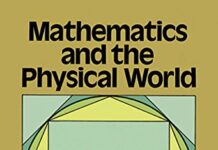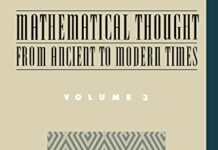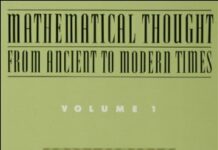
Ebook Info
- Published: 1964
- Number of pages: 512 pages
- Format: PDF
- File Size: 12.92 MB
- Authors: Morris Kline
Description
This book gives a remarkably fine account of the influences mathematics has exerted on the development of philosophy, the physical sciences, religion, and the arts in Western life.
User’s Reviews
Reviews from Amazon users which were colected at the time this book was published on the website:
⭐I graduated in physics several years ago. It happens in life that you first do things and later you understand what you have done. With this book it happened to me to understand most of what I have studied after I have read it. It was a turning point in my life and in my career too. This doesn’t mean it will be the same for everybody but surely that was my experience. Since I have read it, I have never forgot the following paragraph.When earth was put apartGranted that it was the superior mathematics of the new theory which inspired Copernicus and Kepler, and later Galileo, to repudiate religious convictions, scientific arguments, common sense, and well-entrenched habits of thought, how did the theory help to shape modern times?First, Copernican theory has done more to determine the content of modern science than is generally recognized. The most powerful and most useful single law of science is Newton’s law of gravitation. Without anticipating here the discussion reserved for a more appropriate place in this book we can say that the best experimental evidence for this law, the evidence which established it, depends entirely on the heliocentric theory.Second, this theory is responsible for a new trend in science and human thought, barely perceptible, at the time but all-important today. Since our eyes do not see, nor our bodies feel, the rotation and revolution of the Earth, the new theory rejected the evidence of the senses- Things were not what they seemed to be. Sense data could be misleading and reason was the reliable guide. Copernicus and Kepler thereby set the precedent that guides modern science, namely, that reason and mathematics are more important in understanding and interpreting the universe than the evidence of the senses. Vast portions of electrical and atomic theory and the whole theory of relativity would never have been conceived if scientists had not come to accept the reliance upon reason first exemplified by Copernican theory. In this very significant sense Copernicus and Kepler began the Age of Reason, in addition to fulfilling the cardinal function of scientists and mathematicians, that is, to provide a rational comprehension of the universe.By deflating the stock of Homo sapiens, Copernican theory reopened questions that the guardians of Western civilization had been answering dogmatically upon the basis of Christian theology. Once there had been only one answer; now there are ten or twenty to such basic questions as: Why does man desire to live and for what purpose? Why should he be moral and principled? Why seek to preserve the race? It is one thing for man to answer such questions in the belief that he is the child and ward of a generous, powerful and provident God. It is another to answer them knowing that he is a speck of dust in a cyclone.Mathematics in Western culture, Morris Kline, 1953
⭐This is a book about the philosophy of mathematics. The author considers the effect of development of mathematics on many aspects of our culture including music, art, and various sciences. I purchased the book because it was selected by Prof. Judith V. Grabiner as “essential reading” for Lecture One in her course, “Mathematics, Philosophy, and the `Real World'”, produced by The Great Courses (formerly The Teaching Company). She says of this book in the course bibliography: “A magisterial work, addressing many of the topics in this Teaching Company course in its 472 pages. Though it does not reflect scholarship since the 1960s [copyright 1953] and reserves a good deal of its sympathies for those who share the modern Western worldview, it orients the reader well and contains many insights.” The reader does not have to know mathematics beyond high school to understand this book. It is more about the role mathematics has played in the development of the rest of western culture than it is about how mathematics works.Kline, in several places in the book, forced his basic premise by concluding that modern thought in many disciplines would not be important without the influence of mathematics. For example, in Chapter XVIII, in a discussion of Literature, he argues: “…Just as the successful businessman in the twentieth-century America has become the authority in our time, so mathematicians, successful in revealing and phrasing the order in nature, became the arbiters of the language, style, spirit, and content of seventeenth- and eighteenth-century literature. The biggest literary figures of the age decided that their writings were inferior in all respects to the mathematical and scientific works and that prose and poetry could be improved by following these examples…” If the reader can get past these over-zealous conclusions, there are many thought-provoking sections which make this a good read. Kline closes the book with the statement: “…Mathematics is variously described as a body of knowledge, as a practical tool, as a cornerstone of philosophy, as the perfection of logical method, as the key to nature, as the reality in nature, as an intellectual game, as an adventure in reason, and as an aesthetic experience.” He made a good argument for all of those conclusions. I was glad I read the entire book. I purchased the Kindle version for the ease of reading in bed [472 pages!], and the convenience of having the Kindle dictionary handy. I am satisfied with my purchase, and believe it met Professor Grabiner’s and my expectations as a foundation test for her excellent course.
⭐A must read for every scholar!
⭐This book gives you an excellent introduction to the role of mathematics in real life without making heavy demands on your comprehension of mathematics. The writing is graceful and often amusing. I expect to hear screaming because the author stresses how much Western civilization advanced because mathematics was important: two ideas many find offensive.
⭐If you are a Morris Kline fan, this is a must have. Love his writing style and presentation.
⭐Highly recommended for a novice like myself. Gives the reader much needed perspective in the history of ideas in an unthreatening and engaging way. Great read.
⭐Just a great introduction to mathematics as a science.
⭐This is a well-written overview of the role of maths in western culture. It is comprehensible to the layman – no deep mathematical knowledge is required. My only criticism is that I would have preferred greater recognition of the extent to which western maths has drawn on developments made by other cultures, particularly in India and the Middle East.
⭐This is a brilliantly written book, which helps me to understand many mathematical topics that hitherto have been a bit of a blur. Highly recommended.
⭐A lot of information
⭐Excellent service and a very nice and clean copy of the book.
Keywords
Free Download Mathematics in Western Culture 1st Edition in PDF format
Mathematics in Western Culture 1st Edition PDF Free Download
Download Mathematics in Western Culture 1st Edition 1964 PDF Free
Mathematics in Western Culture 1st Edition 1964 PDF Free Download
Download Mathematics in Western Culture 1st Edition PDF
Free Download Ebook Mathematics in Western Culture 1st Edition



